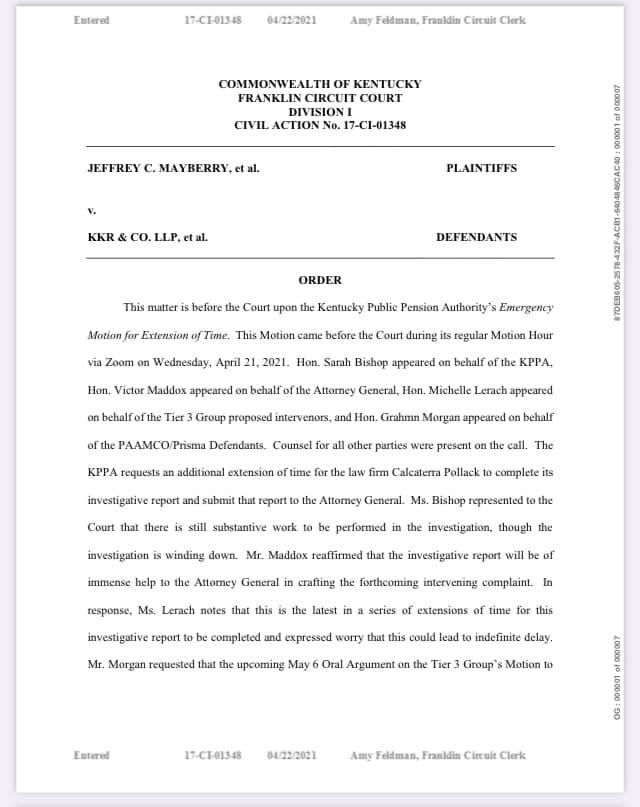
The investigative report prepared by Calcaterra Pollack under a $1.2 million contract with the Kentucky Public Pension Authority will remain a well-guarded secret for now.
https://secure.kentucky.gov//TransparencyWebApi/v1/Contract/ContractPDF…
On April 21, the KPPA denied the Kentucky Open Government Coalition's open records request for "the report prepared by Calcaterra Pollack, LLP, under the $1.2 million contract with the Kentucky Retirement Systems 'to investigate specific investment activities conducted by the Kentucky Retirement Systems to determine if there are any improper or illegal activities on the part of the parties involved.'"
KPPA explained that "[t]he records responsive to your request do not constitute a final report, rather they are still in draft format. Under KRS 61.878(1)(i), the responsive records are currently exempt from inspection or production as preliminary drafts."
https://apps.legislature.ky.gov/law/statutes/statute.aspx?id=49156
We question whether a report qualifies as a "draft" after it has been transmitted to the KPPA, circulated to Kentucky Retirement Systems and County Employee Retirement Systems trustees, and formed the basis of at least one — likely many more — closed session discussions under the dubious invocation of the open meetings exception permitting discussion of proposed or pending litigation against or on behalf of a public agency.
As recently as the April 19, trustee Prewitt Lane made reference to the "minutiae" of the report in attempting to explain his reasons for recusing himself from the scheduled closed session. Lane was interrupted by an unidentified participant in the Zoom meeting who objected to any public discussion of the report, expressing the view that such discussion must be reserved for the closed session.
Clearly, the report is sufficiently "final" that Calcaterra Pollack delivered it to the KPPA, and the KPPA delivered it to KRS and CERS trustees. It can be inferred that the findings it contains are sufficiently "final" as to justify the trustees' reliance on them in deciding whether to pursue litigation or some other legal strategy.
https://apps.legislature.ky.gov/law/statutes/statute.aspx?id=48229
We would be left to wonder what action or event will trigger finality of the Calcaterra report but for the Franklin Circuit Court's April 21 order granting the KPPA's
Emergency Motion for [an additional] Extension of Time "for the law firm Calcaterra Pollack to complete its investigative report and submit that report to the Attorney General."
In his order, an obviously frustrated Judge Phillip Shepherd notes that "The Court is acutely aware that this will be the third extension that the Court has granted for completion of this investigation, and the Court agrees that the investigation cannot be used to forestall this case indefinitely."
He admonishes that "this will be the final extension that the Court will grant for KPPA to turn in its investigative report to the Attorney General," directing KPPA to deliver the report to the OAG by May 17.
Finally, Judge Shepherd warns that "[i]f the investigative report is not submitted by the May 17 deadline, counsel for KPPA will be required to appear before the Court to show cause why the investigation has not been completed despite the deadline for completion being repeatedly extended. The KPPA should also make the Calcaterra Pollack principals who are performing the investigation available for the Court's inquiry in the event the May 17 deadline is not met. This will be the final extension for submission of the report that the Court will grant, and failure to meet this deadline could result in penalties and sanctions for KPPA."
It appears the judge has reached the end of his tether!
But this does not answer the remaining question: Can KPPA continue to successfully resist public disclosure of the Calcaterra Pollack report — in which Kentucky's taxpayers have a $1.2 million investment — after May 17?
If recent legal history is any guide, the answer is an unqualified "no!"
In a 2020 opinion, Frankfort News Media, LLC v Rick Rogers, Judge Shepherd ruled that the open records law mandated full disclosure of an investigative report prepared by a Lexington law firm under contract with the Franklin County Jailer "to review allegations concerning working conditions at the Franklin County Regional Jail, and whether there was evidence to substantiate allegations of 'workplace behavior constituting a sexually hostile, or sexually harassing work environment."
https://bloximages.newyork1.vip.townnews.com/state-journal.com/content/…
The court pointedly reasoned:
"[This] case presents the issue of whether a public agency should redact the narrative of a report submitted by outside counsel, and paid for with tax dollars, that recommended remedial actions to address the problem of sexual harassment at the Franklin County Regional Jail."
Against a minimal privacy interest, the court "balance[d] the public's right to inspect these records. In doing so, the Court [took] notice that, '[a]t its most basic level, the purpose of disclosure focuses on the citizens' right to be informed as to what their government is doing.' For example, through disclosure of complaints and investigation materials, the public can discern whether county agencies—funded by taxpayer dollars—are efficiently and effectively investigating and addressing employee misconduct. This provides insight into the behavior of government employees, as well as the efficiency and productivity of our public workplaces. Perhaps more importantly, it ensures that investigations are handled competently and without favoritism."
In closing, the Franklin Circuit Court declared: "The taxpayers paid for this report. They have a right to review it in full."
Engaged "to investigate specific investment activities conducted by the Kentucky Retirement Systems to determine if there are any improper or illegal activities on the part of the parties involved," Calcaterra Pollack stands in relation to the KPPA as the law firm engaged by the Franklin County Jailer to investigate sexual harassment in the local jail.
The taxpayers paid for both reports. The taxpayers have a right to review both reports in full. After May 17, the KPPA can no longer hide behind the preliminary drafts exception to the open records law.


